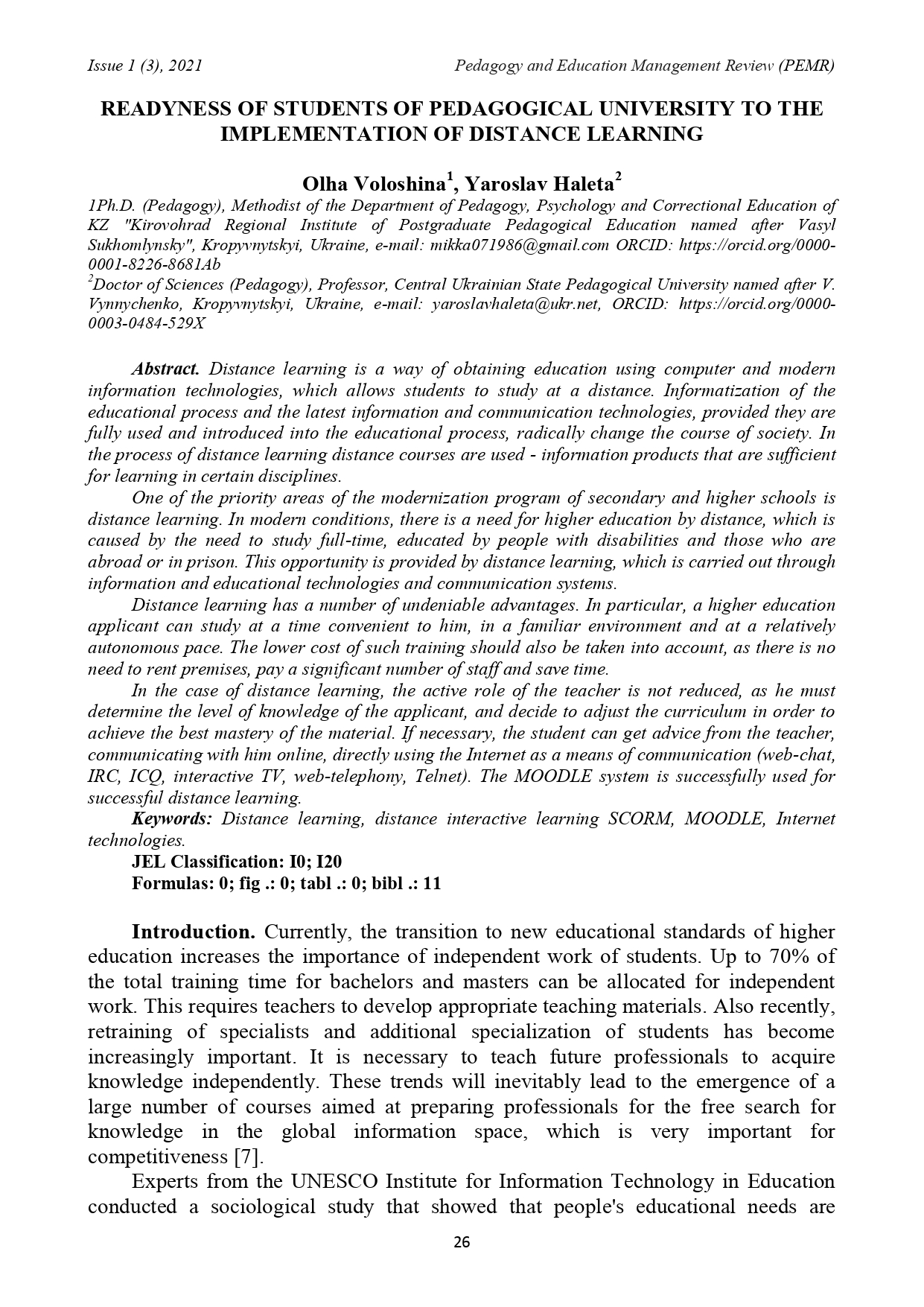READYNESS OF STUDENTS OF PEDAGOGICAL UNIVERSITY TO THE IMPLEMENTATION OF DISTANCE LEARNING
DOI:
https://doi.org/10.36690/2733-2039-2021-1-26Keywords:
Distance learning, distance interactive learning SCORM, MOODLE, Internet technologiesAbstract
Distance learning is a way of obtaining education using computer and modern information technologies, which allows students to study at a distance. Informatization of the educational process and the latest information and communication technologies, provided they are fully used and introduced into the educational process, radically change the course of society. In the process of distance learning distance courses are used - information products that are sufficient for learning in certain disciplines.
One of the priority areas of the modernization program of secondary and higher schools is distance learning. In modern conditions, there is a need for higher education by distance, which is caused by the need to study full-time, educated by people with disabilities and those who are abroad or in prison. This opportunity is provided by distance learning, which is carried out through information and educational technologies and communication systems.
Distance learning has a number of undeniable advantages. In particular, a higher education applicant can study at a time convenient to him, in a familiar environment and at a relatively autonomous pace. The lower cost of such training should also be taken into account, as there is no need to rent premises, pay a significant number of staff and save time.
In the case of distance learning, the active role of the teacher is not reduced, as he must determine the level of knowledge of the applicant, and decide to adjust the curriculum in order to achieve the best mastery of the material. If necessary, the student can get advice from the teacher, communicating with him online, directly using the Internet as a means of communication (web-chat, IRC, ICQ, interactive TV, web-telephony, Telnet). The MOODLE system is successfully used for successful distance learning.
Downloads
References
Batsurovskaya, I. (2010), Tekhnolohiyi dystantsiynoho navchannya u vyshchyy osviti [Technologies of distance learning in higher education] [Electronic resource], Access mode: http://www.confcontact.com/20110225/pe4_samojl.htm [in Ukrainian].
Bikov, V. (2015), Dystantsiyne navchannya v krayinakh Yevropy ta SSHA i perspektyvy dlya Ukrayiny [Distance learning in Europe and the United States and prospects for Ukraine], Academy of Pedagogical Sciences of Ukraine, Institute of Teaching, рр. 77–144 [in Ukrainian].
Veremchuk, A. (2013), Problemy i perspektyvy dystantsiynoho navchannya u vyshchykh navchalʹnykh zakladakh [Problems and prospects of distance learning in higher education], Problems of training a modern teacher, № 7, рр. 319-325 [in Ukrainian].
Klokar, N. (2012), Metodolohichni osnovy zaprovadzhennya dystantsiynoho navchannya v systemi pidvyshchennya kvalifikatsiyi [Methodological bases of introduction of distance learning in the system of advanced training], Way of education, № 4 (46), рр. 38-41 [in Ukrainian].
Kontseptsiya rozvytku dystantsiynoyi osvity v Ukrayini [The concept of development of distance education in Ukraine] (approved by the Resolution of the Ministry of Education and Science of Ukraine, (2000) [in Ukrainian].
Mukoviz, O., (2016), Osnovy organizatsii distantsiinoho navchannia u sistemy neperervnoi osviti, [Fundamentals of distance learning in the system of continuing education] [methodical recommendations], Uman, 66 p. [in Ukrainian] .
Polozhennya pro dystantsiyne navchannya [Regulations on distance learning], (2004), (Approved by the order of the Ministry of Education and Science of Ukraine 21.01.2004 № 40) [Electronic resource] // Access mode: http://zakon4.rada.gov.ua/laws/show/z0703-13#n18 [in Ukrainian].
Sostoyaniye obrazovatel'nykh potrebnostey vzroslogo naseleniya krupneyshikh stran SNG i vozmozhnostey ikh realizatsii posredstvom tekhnologiy DO/ Distantsionnoy obucheniya v stranakh SNG. Monitoring obrazovatel'nykh potrebnostey i vozmozhnostey. Analiticheskiy obzor [The state of educational needs of the adult population of the largest CIS countries and opportunities for their implementation through DO / Distance learning technologies in the CIS countries. Monitoring of educational needs and opportunities. Analytical review], (2003), UNESCO Institute for Information Technology in Education, Moscow, р. 53 [in Russian].
Polat, Е., Bukharkina, М., Moiseeva, М., (2004), Teoriya i praktika distantsionnogo obucheniya [Theory and practice of distance learning: Textbook. manual for students. higher ped. textbook institutions], 416 p [in Russian].
Uznadze, D., (2003), Psikhologiya ustanovki [Psychology of installation], 416 р [in Russian].
Shovkun, V., (2016), Vykorystannya dystantsiynykh tekhnolohiy u protsesi pidhotovky maybutnikh uchyteliv informatyky [The use of remote technologies in the process of training future teachers of computer science], Open educational e-environment of modern university, № 2, рр. 281-292 [in Ukrainian].






